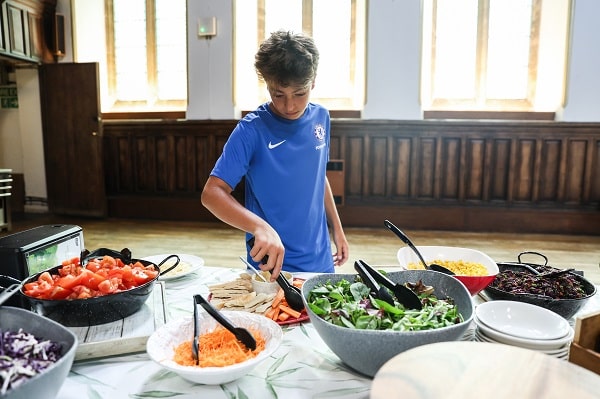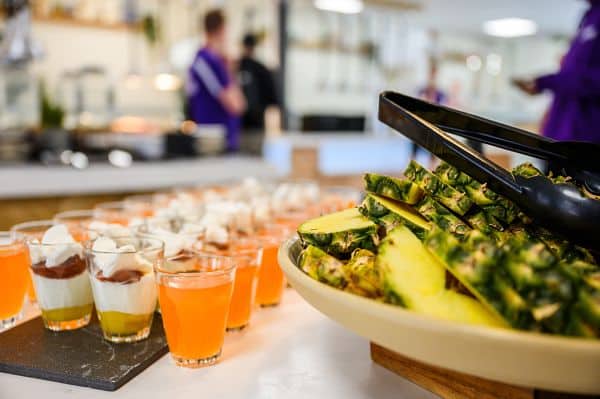What’s the Ideal Diet to Boost Your Sports Performance?
Want to run faster, last longer in training, be more explosive, or recover quicker after a workout?
If you play sports regularly, know that training alone isn’t enough — what you eat every day plays a key role in your performance.
Whether you do track and field, dance, basketball, swimming, or any other sport, eating well can help you improve faster, prevent injuries, and stay in top shape.
You don’t need to be a nutrition expert — just knowing a few good habits can make a big difference.
We’ll break it all down for you right here!

Why Is Nutrition So Important for Young Athletes?
Your body is like a machine — and to perform well, it needs the right fuel. Eating the right foods helps you:
- Have more energy during training and games
- Recover faster after exercise
- Build stronger muscles and boost your immune system
- Stay focused and sharp
- Reduce the risk of injuries
In short: nutrition is just as important as training for young athletes.
And the good news? Eating well doesn’t have to be complicated!
Eating Well Doesn’t Mean Giving Up What You Love
A lot of people think eating healthy means giving up all the fun stuff. Not true! You can still eat what you enjoy — as long as you keep it balanced and choose the right foods at the right times.
The key is to eat a variety of natural, quality foods, and learn how to make smart choices before, during, and after your workouts.
The 3 Pillars of Nutrition for Young Athletes
Here are the three main food groups every young athlete should know:
1. Carbohydrates – For Your Energy
Carbohydrates (or complex sugars) are your fuel to move. They’re what help you run, jump, defend, or attack without crashing after 10 minutes.
Where to find them:
- Rice, pasta, whole grain bread, couscous
- Potatoes, sweet potatoes
- Oatmeal
- Fruits like bananas, dates, or apples
Pro tip: Eat carbs about 2 hours before a training session or game to fuel up without feeling too heavy.
2. Protein – For Your Muscles
Protein helps build, strengthen, and repair muscles. If you want to get stronger, more resilient, and recover faster, you need protein after each session.
Where to find it:
- Lean meats (chicken, turkey), eggs, fish
- Dairy products (plain yogurt, cottage cheese)
- Legumes (lentils, chickpeas, kidney beans)
- Tofu, tempeh for vegetarians
Pro tip: Eat a source of protein after your workout to support recovery.
3. Healthy Fats – For Your Endurance
Not all fats are bad! Some are great for your heart, brain, and long-lasting energy.
Where to find them:
- Avocados, nuts, almonds, seeds
- Plant-based oils (olive, canola, flaxseed)
- Fatty fish (salmon, sardines, mackerel)
Pro tip: A handful of almonds or walnuts makes a perfect pre- or post-workout snack.
What About Hydration? It’s Essential!
Even mild dehydration can lower your performance. You might lose focus, speed, and overall effectiveness.
Here are a few simple rules:
- Drink regularly throughout the day (not just during practice)
- Aim for 1.5 to 2 liters per day, or more if it’s hot or you sweat a lot
- Drink water, and avoid sodas or sugary energy drinks
What to Eat Before and After a Workout
Before Exercise:
Have a proper meal about 2 to 3 hours before you move. It should include carbs, a bit of protein, and be low in fat.
Example:
- Whole wheat pasta + chicken + cooked vegetables
- A piece of fruit (banana or apple)
After Exercise:
Your body needs to refuel and repair your muscles. Eat a meal or snack within one hour after training.
Example:
- Rice + eggs + vegetables
- Cottage cheese + applesauce
3 Easy Snack Ideas for Young Athletes
- Whole grain bread + peanut butter + banana
- Plain yogurt + berries + honey
- Homemade smoothie with plant-based milk + banana + oats
These snacks are simple, quick to prepare, and perfect before or after sports.

What About Young Soccer Players?
Soccer is a very complete sport. You need endurance, speed, power, and focus. To play 90 minutes at full intensity, your nutrition needs to match your effort.
Before a game, make sure to eat a full meal at least 2 hours before kickoff, with complex carbs (like rice or whole wheat pasta), lean protein, and vegetables.
About 30 to 60 minutes before the match, you can also have a banana or a homemade energy bar for a final boost.
After the game, refuel with a solid meal rich in carbs and protein to help your muscles recover faster.
Looking For Soccer offers camps at top clubs where everything is designed and adapted for young soccer players and their development—and yes, that includes sports nutrition.
During these camps, you’ll get practical tips on how to build healthy eating habits so you can perform at your best while taking care of your body!
